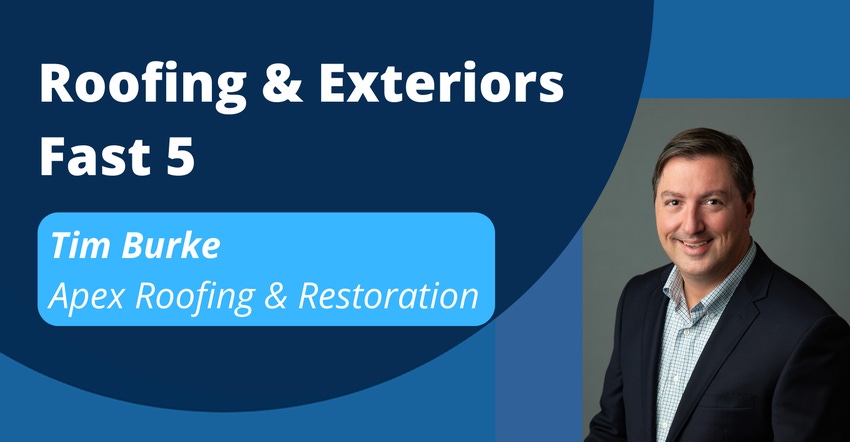Focus on People and Processes to Unlock Exceptional Results
Tim Burke, CFO at Apex Roofing & Restoration, shares expert insights into the biggest ROI for roofing companies and why execution and engagement have a bigger impact than strategy.

For this edition of the Fast 5, Apex Roofing & Restoration CFO Tim Burke spoke with Roofing & Exteriors about providing financial leadership—and more—at a successful roofing company. With nearly a quarter century of professional experience, Burke brings a great deal to his new leadership role with the Birmingham, Alabama, company. He began his career as an investment banker and has since managed a family office, served on boards, facilitated private equity investments and served in other executive management roles.
Fast 5 is a Q&A series featuring the insights and expertise of construction industry experts. Here's what Burke had to say.

What is most important to remember when providing financial leadership at a roofing company?
Burke: Whether in the roofing industry or at any other type of company, the most important thing for a leader to remember is that your most valuable assets are your people. People don’t depreciate—with every day, they become more experienced and more valuable. Investing in the development of team members is the best return on investment.
We have to drive a problem-solving culture, make problems visible, and teach people how to have discussions and make decisions based on the deliberate study of facts. Too many companies engage in impulsive and emotional decision-making for the sake of speed, but those actions lead to short-lived improvements that are not sustainable.
People who are highly engaged and developed at problem-solving become extremely valuable. They deserve ever-improving pay, benefits and career opportunities. That is how you should prioritize your capital.
How does your experience with running a family office translate to your new leadership role with Apex?
Burke: You could say that I am an accidental executive. I left investment banking to launch a family office to manage the assets of a previous client. It was unplanned, but in that role, I ended up running the family’s largest holding, an advanced manufacturing company. At that company, we were lucky to have Toyota teach our entire management team and workforce the Toyota Production System. I learned more from that experience than from any deal, investment, financing or business education I had ever previously been a part of.
Up to that point, I had constantly been taught that business is all about strategy. What I learned from Toyota was that strategy is easy—it’s the execution that matters, and engaged team members drive good execution. If a company’s employees consistently deliver the highest quality product on time and at a good value, that company always wins.
It’s an extremely simple formula to understand but exceptionally hard to do. Toyota's guidance taught me to understand my customer and what they value, and then to empower employees to deliver it. It was a valuable life lesson.
What advice do you have for roofing contractors who have deep industry expertise but who may feel less equipped to handle the financial side of the business?
Burke: My first recommendation would be to put down the job cost reports, and go out and buy the book “Lean Thinking: Banish Waste and Create Wealth in Your Corporation” by James Womack. Study it fastidiously, have a book club, talk about it with your partners and try to change your thinking.
Being part of the construction industry, roofing tends to be laser-focused on costs and much less focused on value. I am continually amazed by the number of companies in construction-related businesses that spend all their resources trying to understand job costs to the tenth of a decimal point but rarely focus on value from the perspective of the customer.
Customers value high-quality customer service, on-time completion and a high-quality, defect-free result. Despite this, only a third of construction projects in the U.S. are completed on time, most with post-construction quality problems. Not surprisingly, these late projects go over budget. So, in response, construction executives obsess over cost, but their issue is wasted time and wasted resources—cost is simply a byproduct.
Instead of worrying about job cost reports, time is better spent focusing on matching their process paces to customer demand and relentlessly eliminating queues, mistakes, backlogs and stagnation of material. Their costs will naturally fall, and their profits will rise. It’s easy to understand but hard to do because it takes great patience and discipline.
How do you see technology’s role—especially as it relates to company finances—growing and changing in the roofing industry in the coming years?
Burke: The number of industry-specific SaaS cloud solutions is exploding. It is very tempting to believe there are technologies that will solve your problems.
My view of technology is heavily influenced by my time with Toyota. Technology is a tool, no different than a hammer or a paintbrush. In the hands of a poorly trained person or as part of a bad process, that tool will produce a poor result. I think about technology as being the third step in a sequence of People, Processes and Technology.
First, you develop your people. Then, through hypothesis and experimentation, those people develop sound processes. Only after a business process is sound should you leverage technology and automation to make processes more efficient and productive. Bill Gates famously said, “The first rule of any technology used in a business is that automation applied to an efficient operation will magnify the efficiency. The second is that automation applied to an inefficient operation will magnify the inefficiency.”
At Apex, we are extremely cutting-edge when it comes to technology, but it is our people and the processes they have developed that make technology deliver exceptional results. We start with tracking data on a whiteboard, then iron out the process, and finally improve the process by experimenting with automation and technology. Once it works, we deploy the technology broadly. We are very heavy users of technology, and we are good at pivoting quickly and adapting our technology usage as needed.
We are leveraging technology to enhance functional business processes in all aspects of our business: financial accounting, customer management, purchasing, fleet management, scheduling and more. However, we are not deluded by the notion that technology alone will solve problems.
"That we can leverage technology quickly and effectively is a testament to our people and process-development acumen, not to the bells and whistles of any particular software package." —Tim Burke, CFO, Apex Roofing & Restoration
What challenges come with the type of growth Apex has experienced over the last 12 months? How can companies prepare financially for that type of growth?
Burke: The right team focused on long-term, system-oriented thinking toward delivering customer value is key. I have spent my career dealing with high-growth companies that are typically at an inflection point where they are transitioning from a small business to a larger company that is dominant in their industry.
At Apex, we are undergoing that transition. Our executive team is fortunate to be supported by an owner committed to building a business for the long term. As we scale, we are building systems and infrastructure that will enable us to scale both geographically and strategically. We invest in our team members and their development.
We have one of the best problems a company can have—a challenge in meeting rapidly growing demand. Over the past 12 months, we have had to rapidly expand our corporate infrastructure and build out our leadership at all levels of the company to meet this demand.
Our executive team works hard to drive a strong culture focused on the basics—providing the highest quality service on time and at a good value. I am confident we have the right team to do it.
Read more about:
Fast 5About the Author(s)
You May Also Like




